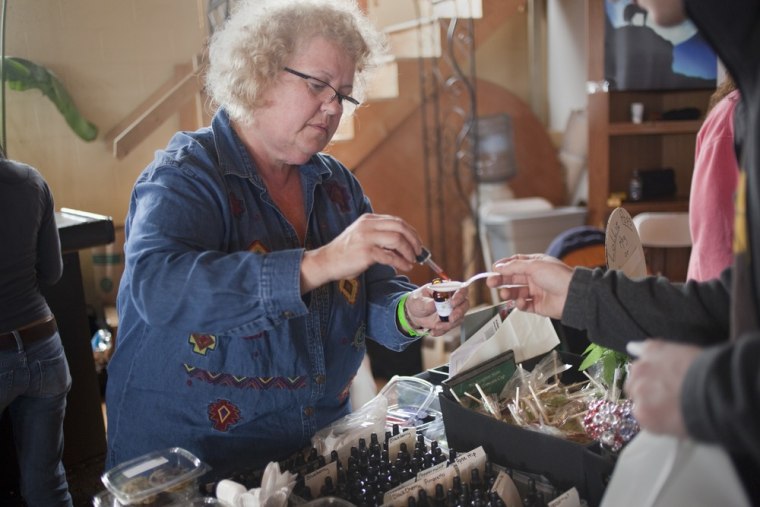In many ways, medical marijuana entrepreneurs are no different than any other business start-ups: They need a business plan, venture capital and a fair dose of fortitude.
They also are likely to have something not generally found in most small-business owners: an activist streak.
More than half (58 percent) of those in the burgeoning industry say they started their businesses to promote expansion of medical marijuana or outright legalization, according to a report released last month analyzing the growing market. Only 12 percent said “financial opportunity” was their primary motivation.
You are unlikely to find numbers like that on Wall Street, Silicon Valley or even Main Street. A survey conducted by the National Federation of Independent Business found that 29 percent of people starting a business said making money was their primary motivator.
Jeffrey Miron, director of undergraduate studies at Harvard's Economics Department, finds the data on cannabis entrepreneurs interesting — but not surprising.
"This has been a suppressed industry for decades. People have had to worry about jail time and asset forfeiture. So it is understandable that the people in this industry have a passion for social change," said Miron, who has studied and written extensively about drug prohibition. "And let's be very clear here: Making money and activism aren't mutually exclusive. They can do both."
Jeremy Miller, director of the Sacred Plant Medicine marijuana dispensary in Tacoma, Wash., and founder of the Cannabis Farmers Markets in Seattle and Tacoma, is one of these activist-entrepreneurs.
“Most of us in this industry have been fighting for the cause for years. I have been active in the marijuana movement for over 20 years, so it has become part of who I am,” Miller said. “Sure, I want to make money, but my activism is core to my business principles.”

When Miller, 39, created the farmers markets late last year, he not only saw a potential financial opportunity, he also envisioned a unique marketplace in which his dispensary competitors would benefit along with his business.
“All of us in this business are still fighting for regulation reform, so we need each other,” said Miller, who has launched a number of businesses in the music and marijuana industries. “At this stage in my business, I am more concerned about building a viable ecosystem of commerce than I am about profits.”
So-called "ganjapreneurs" will be a prominent part of the of NORML, the largest public-interest marijuana lobbying organization, which opens Wednesday in Denver — the Mile High City. The theme of the event is “Coming of Age,” a reflection of the status of cannabis commerce.
"Colorado has become the center of America's legalization fight, and we want to both encourage that movement and learn how we might more effectively export that fight to other states," said Allen St. Pierre, NORML’s executive director. Colorado passed its first medical marijuana law in 2000 and is now the nation's No. 2 market for legal marijuana, behind California.
Edible wholesaler Simply Pure is an example of a business that has found success in Colorado's growing market for medical marijuana. Owned and operated by husband-and-wife entrepreneurs Wanda James and Scott Durrah, Simply Pure opened just last year after the couple sold their retail dispensary.
Now, Simply Pure’s cannabis-laced edible products, including popular peppermint cups, are sold in 225 of Colorado’s 450 legal dispensaries. Business is booming, James says, but the bottom line is only one metric of success. “We do this because we love business. But you can’t be successful in this industry if you don’t respect the movement."
For Durrah, an award-winning restaurateur in Los Angeles and Denver, and James, a political organizer, business will only improve as market conditions become more business-friendly.
“Simply Pure is a business, to be sure,” says James. “But to us, it is more than that. It is a health issue, a legal issue and a civil-rights issue. We are pleased with our business success, but we are very proud of what we have contributed to the larger marijuana movement. I think we are establishing a business model that can be used for second- and third-generation businesses.”
James concedes that risks can be high in an industry with shifting regulations and market uncertainty. “For a lot of businessmen, the risk-reward ratio for a medical marijuana business would not pencil out. But if you believe in the cannabis movement, it’s a no-brainer. We’re part of a massive social change, and that is exciting. Our motto at Simply Pure is 'changing society and building business.' ”
Some entrepreneurs, like Kathy Parkins of Seattle, entered the business for reasons related to their own health. Parkins has used cannabis for more than 10 years to treat chronic pain caused by fibromyalgia.
"Prescription drugs make me sick. I can't take them. This [cannabis] is my alternative," says Parkins, 54, who makes cannabis-infused tinctures, baked goods and candy under the brand name Cannabis Cannaceuticals.
In 2007, Parkins was arrested for possession of a small amount of pot and spent a week in jail. For Parkins, her business is a directly related to her legal experience. "I know what this herb does for me. It has incredible healing power. And I've been locked up because of it. I just don't want anybody to have to go through what I did just to get medicine," she said. "Yes, it is a profitable business. But in my heart, I am helping others to relieve their pain."
There is little doubt that there is a lot of green to be made from the green herb. Medical marijuana accounts for sales of an estimated $1.7 billion annually in the 15 states where it is legal or quasi-legal, according to the report released last month by See Change Strategy, which does financial analysis of new and unique markets. The figure represents estimated sales of marijuana through dispensaries.
As the market grows, investors are standing by, waiting for their opportunity.
"Angel investors have been key to biotech, green tech and social media startup investment,” says Troy Dayton, CEO of San Francisco-based angel investor network ArcView Group. “It is a logical step for angel investors to take a sharp look at the cannabis industry's emergence. It doesn't take a rocket scientist to realize that there is a lot of money to be made in this sector. And it actually warms my heart to see that its not all about the money. Perhaps surprisingly, that's what I'm hearing from investors, too."
More information:
